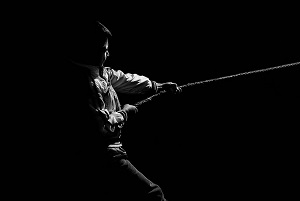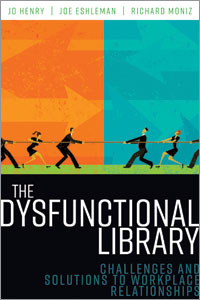Solving the dysfunctional library: a conversation with Jo Henry, Joe Eshleman, and Richard Moniz
Frankly, it's not something we like to talk about. There is an unfortunate stigma to acknowledging workplace dysfunction, let alone trying to grapple with the problem. But negative behaviors such as incivility, toxicity, deviant behavior, workplace politics, and team and leadership dysfunction not only make the library a stressful workplace, they also run counter to the core values of librarianship. So what's to be done? In their new book on the topic, Jo Henry, Joe Eshleman, and Richard Moniz take a close look at these negative relationship-based issues and suggest workable solutions. In this interview they discuss their collaboration and how library staff can handle workplace conflicts.
What was the genesis of the book? Why did you decide to write a book on this topic?
As frequent collaborators, we had always touched on different topics related to leadership and management when we got together. At one point we started more concretely discussing the possibility of updating Richard's textbook Practical and Effective Management of Libraries. It's a solid work for understanding management principles. That said, it didn't really get after the most difficult challenges librarians and library managers might face. In talking it through we decided that we specifically wanted to  tackle the really tough issues. We all saw various examples of dysfunction either in our own libraries or in other organizations that we had interacted with. We all knew colleagues that had dealt with challenging situations. With that in mind, we felt as though we could both learn a lot and maybe help others by diving deep into the topic.
tackle the really tough issues. We all saw various examples of dysfunction either in our own libraries or in other organizations that we had interacted with. We all knew colleagues that had dealt with challenging situations. With that in mind, we felt as though we could both learn a lot and maybe help others by diving deep into the topic.
You've all collaborated on writing projects before. Was there anything different this time around? How do you keep track of who's doing what?
That's true. We really enjoy working as a team. All three of us have a passion for librarianship and we each bring a different perspective. While one of us may take the lead on a given project, book ideas have typically been generated through vigorous discussion. Once we have a project, we divide that writing by individual interest and set our internal timelines. Jo is definitely the leader when it comes to keeping us on track. If there was ever an excellent project manager, it's Jo. Joe is our "big idea" person on the team. He challenges himself and the rest of us to not settle for an easy answer. Often times, he will raise unique points "outside the box" that make our projects deeper and more interesting. Richard can be pretty driven when it comes to keeping on track and he frequently brings his practical experience as a library director to bear on issues. We love the talks that we have as we often get together/email while working on a project. There was not a lot different this time around other than an increased trust factor. We don't want to let each other down and we try to bring our best selves to each project. We think we did that this time as well.
Because of technology, human beings are more connected to one another than ever before; yet basic communication skills seem to be worse than ever. Why do you think that is?
We see both good and bad examples in the workplace and with our patrons. One can definitely see that the younger generation tends to be "plugged in" all the time and may, as a result, have lost a bit of the connection and skill sets for face to face communication which has been shown to be a more robust communication method. The book even touches on these generational differences in the realm of workplace incivility. For example, millennials would rather move on in a dysfunctional workplace than try to adapt or find a solution. We also discuss communication distortion and how sending and receiving messages can lead to misunderstanding. Utilization of technology in communication may contribute to these misunderstandings. Also, there is a loss of "humanity" itself when communicating through technology. (Think of things such as feedback from sound, gestures, or body language.) Finally, in the book we address how some of the problem in libraries lies in the fact that the profession has such strong roots but is also going through such radical change. We think that part of the challenge may be resistance to change. In the book, you write, "Conflicts are a normal part of life and the library workplace." What are some key steps that both managers and staff can take to deal with conflicts better?
In the book, you write, "Conflicts are a normal part of life and the library workplace." What are some key steps that both managers and staff can take to deal with conflicts better?
There is a whole lot we could say about this but one central point of the book is the need for civility and respect. It is very important that individuals within an organization build rapport, understanding, and learn to appreciate what each person brings to a given team. Conflict should not be avoided when it arises but dealt with in a manner that is respectful and well-considered. Conflicts between individuals should never be allowed to fester. This requires a certain amount of trust. If that's lacking there is little hope of resolving the conflict.
What advice would you give to a librarian who needs to report toxic behavior or harassment?
We would say to take care of yourself mentally. That could mean a number of things. First, you need to be careful not to blame yourself for being stuck in a terrible situation. We are proponents of mindfulness and one type of meditation we recommend is loving-kindness meditation. We think it is important to reach out to others that you trust to share what you are experiencing. If you plan to report an issue to HR or another higher authority be careful to document facts about the situation or situations. Unfortunately, sometimes toxic behavior is so embedded in an organization that the best thing you can do is find a healthier workplace.
How can library leaders harness instability and change for a more functional workplace?
Library leaders need to embrace that aspect of change that taps into creativity and humanity. Realizing that good and open librarians are welcome to change and showing the benefits of accepting change up front are key factors here. In addition to leading by accepting change themselves, library leaders need to realize that change is one of the things that makes us human. Doing the same things day to day or over a long period of time makes us robots and also makes the librarian position one that can be considered to be automated and phased out. The most functional librarian is one who is invested in aspects of their job that tap into their own needs and passions. This is not to say that some of the day to day tasks need to be completely eliminated, but merely to point out to library leadership that embracing and facilitating change can make us more engaged.
Learn more about The Dysfunctional Library: Challenges and Solutions to Workplace Relationships at the ALA Store.
